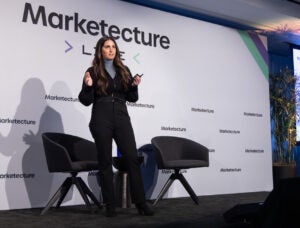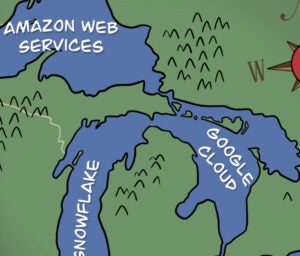 Here’s today’s AdExchanger.com news round-up… Want it by email? Sign-up here.
Here’s today’s AdExchanger.com news round-up… Want it by email? Sign-up here.
The Sleeping Giant
Verizon’s AOL acquisition had a strong strategic rationale in light of the telco’s vast data set. What about AT&T, which has a similarly huge market cap and potential ad platform value? AT&T doesn’t share Verizon’s approach – data-sciencing its mobile subscriber data for advertiser gains – and instead turns to Opera Mediaworks for mobile targeting, because third-party vendors can do more cutting-edge work without privacy concerns, the company tells Mike Shields of The Journal. AT&T is betting on addressable TV as its screen of choice, an opportunity enhanced by its $49 billion purchase of DirecTV. Addressable TV advertising is a sub-$1 billion pool this year … but it won’t always be. Read on.
Shine On
Israeli ad-blocking startup Shine is looking to build a fraud verification product akin to Integral Ad Science, DoubleVerify, Moat, etc., and has hired James Collier, formerly of the Experian-owned device recognition business AdTruth, as chief revenue officer. Shine has aggressively disparaged some of the digital stakeholders it now needs as partners and customers, so Collier may have his work cut out for him. Lara O’Reilly has more at Business Insider.
Instant Scale
Facebook will expand Instant Articles to Messenger, the company said in a blog post. The update, which currently supports Android and will be rolled out on iOS in the coming weeks, allows users to share faster-loading content, designated by a lightning bolt in the top right corner, through a Messenger chat thread. Facebook says it wants to provide a better, more cohesive user experience, but what it really means is that users should remain on Facebook’s platform and publishers should remain dependent on Facebook’s success [AdExchanger coverage]. More at Forbes.
Up A Blind Alley
New York City may have established itself as the clear No. 2 to the Bay Area, writes NYC–based venture capitalist Matt Turck in a blog post, but “a relative dearth of $1 billion-plus exits, a lack of local anchor companies that can serve as acquirers, and a comparatively lower concentration of talent” has put a damper on Silicon Alley enthusiasm. First-wave NYC tech leaders like Gilt, Fab, Tumblr, Admeld and Foursquare have either burned out or are searching for a second wind (or even a third wind). Don’t short New York City tech, but it’s going to take a new cycle of growth and leaders to help it grow into its reputation.
But Wait, There’s More!
- Can The New Currency Of ‘Time Spent’ Change Ad Tech? – MediaPost
- Windows 10 Will Fall Short Of Microsoft’s 1 Billion Device Goal – ZDNet
- Instagram’s Full Court Press Into Sports – Digiday
- Behavioral Mobile Game Analytics Startup Acquired By Mobvista – release
- Line Stock Soars After US And Japanese IPOs – Forbes
- Programmatic Surge Blamed For Drop In UK Ad Viewability – Campaign
- Trapit Debuts Social And Enterprise Tool For Microsoft CRM – release
- Podcasting Has An Ad-Skipping Problem, Too – WSJ
- SessionM, Bottle Rocket Partner On Mobile-First Loyalty Offer – release
- Microsoft Wins Appeal On Overseas Data Searches – NYT
You’re Hired!











